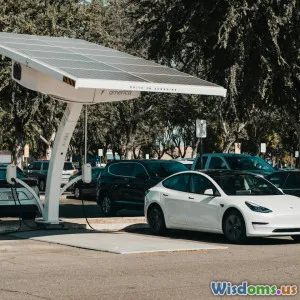
Elettrico vs Ibrido: Qual è la Scelta Migliore
(Electric vs Hybrid: What's the Best Choice)
{7 minuto} lettura Esplora le differenze tra auto elettriche e ibride per determinare quale sia la scelta migliore per le tue esigenze di guida e il tuo stile di vita. (0 Recensioni)
Electric vs Hybrid: What's the Best Choice
In recent years, the automotive industry has witnessed a significant shift towards electrification, with electric vehicles (EVs) and hybrid vehicles (HEVs) gaining popularity. This transformation is largely driven by the need for sustainable transportation solutions that reduce carbon emissions and fuel consumption. In this article, we will delve into the differences between electric and hybrid vehicles, helping you determine which option is better suited for your lifestyle.
Understanding Electric Vehicles (EVs)
Electric vehicles are powered entirely by electricity. They utilize large battery packs and electric motors, allowing them to run without any gasoline or diesel. Here are some key aspects of EVs:
Benefits of Electric Vehicles:
- Zero Emissions: EVs produce no tailpipe emissions, making them environmentally friendly.
- Lower Operating Costs: Electricity is generally cheaper than gasoline, leading to lower fuel costs. Additionally, EVs have fewer moving parts, which can result in lower maintenance costs.
- Incentives: Many governments offer tax incentives, rebates, and grants for purchasing EVs, making them more affordable.
- Performance: Electric motors provide instant torque, resulting in rapid acceleration and a smooth driving experience.
Considerations for Electric Vehicles:
- Range Anxiety: Many consumers worry about the driving range of EVs, although advancements in battery technology are continuously improving this aspect.
- Charging Infrastructure: Access to charging stations can be limited, particularly in rural areas.
- Upfront Cost: While prices are decreasing, EVs can still be more expensive than traditional vehicles.
Understanding Hybrid Vehicles (HEVs)
Hybrid vehicles combine an internal combustion engine with an electric motor, allowing them to use both gasoline and electricity for power. They can operate in various modes, including fully electric, hybrid, or gas-only. Key aspects include:
Benefits of Hybrid Vehicles:
- Improved Fuel Efficiency: HEVs typically offer better fuel economy compared to conventional vehicles, as they can switch between gas and electric power.
- Reduced Emissions: While not zero-emission, hybrids produce fewer pollutants than traditional vehicles.
- No Range Anxiety: Since hybrids use gasoline, drivers don’t have to worry about running out of charge.
- Familiarity: Hybrids have a more familiar driving experience for those used to gasoline vehicles.
Considerations for Hybrid Vehicles:
- Complexity: Hybrids have more components, which can lead to higher maintenance costs over time.
- Battery Replacement: The lifespan of hybrid batteries can vary, and replacement can be costly.
- Less Electric-Only Range: Most hybrids cannot drive long distances on electric power alone.
Comparing Electric and Hybrid Vehicles
| Feature | Electric Vehicles (EVs) | Hybrid Vehicles (HEVs) |
|---|---|---|
| Emissions | Zero | Lower than gasoline |
| Fuel Source | Electric | Gasoline + Electric |
| Driving Range | 100-300+ miles | 400-600+ miles |
| Charging Infrastructure | Needs charging stations | Gas stations available |
| Maintenance Costs | Generally lower | Potentially higher |
| Upfront Cost | Higher initial cost | Generally lower |
Making the Right Choice
Ultimately, the decision between an electric vehicle and a hybrid vehicle depends on your personal needs, driving habits, and values. Here are some questions to consider:
- How far do you typically drive daily? If your daily commute is short, an EV may be ideal. If you take longer trips frequently, a hybrid could be more practical.
- What charging infrastructure is available in your area? Access to charging stations can significantly impact your decision.
- What is your budget? Consider both upfront costs and long-term savings.
Conclusion
As the automotive industry continues to evolve towards sustainable practices, understanding the differences between electric and hybrid vehicles is crucial for making an informed choice. Both options have their advantages and disadvantages, and the best choice ultimately depends on your lifestyle, budget, and environmental considerations. Whichever you choose, both electric and hybrid vehicles contribute to a more sustainable future for transportation.
Valuta il post
Recensioni degli utenti
Post popolari


















